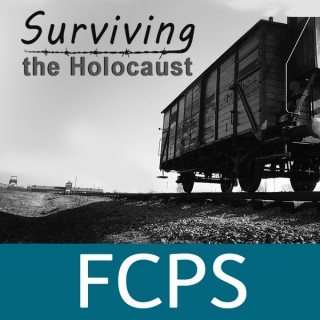
Surviving the Holocaust
Follow Surviving the HolocaustHolocaust survivor Irene Weiss shares her experience as a Hungarian Jew persecuted during World War II. She describes how her family was systematically removed from society, and how she lost most of them in the horrific conditions at Auschwitz-Birkenau.
Fairfax Network, Fairfax County Public Schools
- Apr 13, 2016 LATEST EPISODE
- infrequent NEW EPISODES
- 3m AVG DURATION
- 15 EPISODES
More podcasts from Fairfax Network, Fairfax County Public Schools
Latest episodes from Surviving the Holocaust

Irene discusses the consequences people faced for helping Jews during the war. She explains the transition she witnessed as people went from being afraid of the consequences to embracing the propaganda. She describes the Holocaust as a breakdown in humanity and a setback for civilization.

Irene describes the desperate conditions of the prisoners at liberation. She talks about the realizations that set in during those days, including the loss of family and of their own identities.

Irene talks about arriving in the U.S. and starting school in Brooklyn. She talks about the challenges she faced in learning a new language, as well as facing difficult questions from her classmates. Her experiences had made it very difficult for her to trust in other people.

In a refusal to give up their prisoners to the approaching Allied front, Nazi’s forced the already sick and starving prisoners out of the camps on foot. Irene was among those forced out of Auschwitz, and she describes how she ended up hundreds of miles away and on the verge of death.

Irene makes a final statement about how the Holocaust affected her life.

Irene expresses concerns about our tendencies to follow charismatic leaders. She talks about the importance of critical thinking and analysis to find the truth and make good decisions.

In 2015, the German government pressed charges against a former Nazi who worked at Auschwitz. Irene was asked to testify at the trial, and she describes what it was like to confront him.

Irene discusses how the Holocaust is the result of what happens when people cross the boundaries of basic human decency and kindness. She talks about how even small acts against one another can erode our humanity.

The number of people sent to the gas chambers at Auschwitz was staggering. Irene discusses how she was forced to sort through the belongings of people murdered in the gas chambers, how she watched thousands of people marched into the gas chambers day and night, and how the threat of being sent there herself was constant.

Irene describes in detail her deportation from the Munkacs Ghetto, her arrival at Auschwitz and how the selection at the death camp platforms worked, as Nazis confiscated possessions and separated families. She shares a remarkable historical photo that captured the very moment of her arrival at Auschwitz.

Irene describes how the Nazi government defined the Jewish race as “sub-human.” She discusses the impact of being surrounded by people who do not recognize you as a human being and have no empathy for you.

The Nazis begin displacing Jews from their homes and staging their transport to death camps.

We learn about where Irene grew up in Hungary and how her town began to change as Nazi influences took over.

Irene explains how Jews were systematically targeted by the Nazis in ways that eroded all of their positions in society.

Meet Holocaust survivor Irene Fogel Weiss. She talks about why she has chosen to share her story.

















